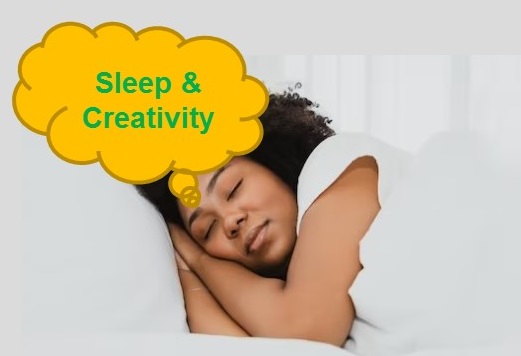Bimola Lekan-Dairo. Bachelor of Physiotherapy (BPT). Freelance Health Writer and DLHA Volunteer. Medically reviewed by the DLHA Team

Quality sleep helps boost creativity.
Let’s say it’s late at night and you’re staring at a problem that refuses to unravel. You’ve brainstormed, researched and paced the room, but the solution feels just out of reach. In frustration, you decide to call it a night and go to bed.
The next morning, as the sunlight streams through your window, the answer suddenly hits you clear, obvious, and brilliant.
Sounds familiar right? Many of the greatest breakthroughs in history didn’t happen after hours of effort but after a good night’s sleep. But why is that? Let’s dive into the fascinating connection between sleep and creativity.
Sleep is far from wasted time. It is one of the most powerful tools for creative problem-solving. During sleep, your brain isn’t just resting; it’s working hard to organize information, form connections and solve problems.
The magic happens during different stages of sleep, but one stage stands out for creativity: REM (Rapid Eye Movement) sleep. Think of REM sleep as your brain’s CPU (as in the Central Processing Unit of your computer) —a place where ideas mix, match, and evolve in unexpected ways.
It’s no wonder that many of history’s brightest minds have credited their “Eureka” moments to sleep.
History is filled with examples of people who solved problems or found inspiration while they slept. Some of the notable examples are Dmitri Mendeleev, the chemist. He was alleged to have dreamt of the periodic table’s arrangement after struggling to organize chemical elements for months. Mary Shelley was also acclaimed to have conceived the story of Frankenstein after a vivid dream, giving birth to one of the most iconic novels of all time.
Even today, athletes, scientists, and entrepreneurs often report waking up with solutions to problems they couldn’t solve the day before. This isn’t luck, it’s the science of sleep at work.
When you’re awake, your brain works like a laser which is always focused and efficient. But does creativity thrive in a more chaotic, open-ended environment? That’s where sleep comes in.
During REM sleep, your brain:
a) Consolidates Memories: Organizing and prioritizing the information you’ve absorbed during the day.
b) Forms Unexpected Connections: Linking ideas that seemed unrelated.
c) Resets Emotional Balance: Reducing stress and providing a fresh perspective.
Studies have shown that people who sleep after facing a problem are more likely to find creative solutions than those who power through without rest.
On the other side, a lack of sleep drains your brain of its creative power. Sleep deprivation impairs your ability to think flexibly, solve problems and stay emotionally balanced.
When you’re tired:
In short, exhaustion narrows your perspective, making it nearly impossible to see innovative solutions.
But do you know you can unlock the full creative potential of sleep? Here are how:
Go to bed and wake up at the same time every day to regulate your body’s internal clock and maximize REM sleep.
Turn off screens at least an hour before sleep. Blue light can disrupt your body’s natural sleep cycle.
Keep your bedroom dark, quiet, and cool for optimal rest.
4. Write down problems befor bed
Jot down a problem you’re trying to solve before sleeping. Your brain might just work on it overnight.
5. Keep a dream journal
Place a notebook beside your bed to capture any insights or ideas that come to you upon waking.
The next time you’re stuck on a problem, don’t burn the midnight oil. Instead, let your subconscious do the work while you sleep.
Sleep isn’t just rest, it’s your brain’s way of rebooting, recharging and reconnecting ideas in ways you can’t imagine. Trust the process, and you might just wake up with the solution or the next world-changing idea.
Sweet dreams and happy problem-solving!
Related: Normal sleep: What Africans should know
Published: November 19, 2024, 2024
© 2024. Datelinehealth Africa Inc. All rights reserved.
Permission is given to copy, use and share content for non-commercial purposes without alteration or modification and subject to source attribution.
DATELINEHEALTH AFRICA INC., is a digital publisher for informational and educational purposes and does not offer personal medical care and advice. If you have a medical problem needing routine or emergency attention, call your doctor or local emergency services immediately, or visit the nearest emergency room or the nearest hospital. You should consult your professional healthcare provider before starting any nutrition, diet, exercise, fitness, medical or wellness program mentioned or referenced in the DatelinehealthAfrica website. Click here for more disclaimer notice.